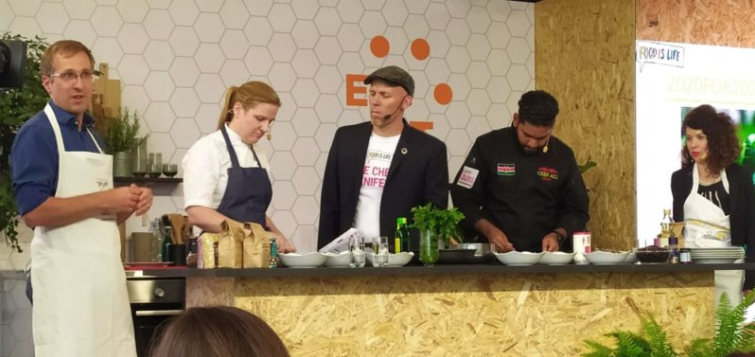By: Aniek Hebinck, Communicator and Researcher at SLU Global & Environmental Change Institute. Aniek holds a Ph.D. in Sustainability Science from the Stockholm Resilience Centre and wrote her thesis on Shaping Sustainable Food Systems.
The EAT Forum carnival is back in town and it’s as ambitious as ever! This year’s edition is themed ‘The Science is Clear: It’s time to Act’.
During two days in June Stockholm becomes the temporary hive for many ‘foodies’ coming from business, policy, academia and civil society. The forum kicked off with messages bouncing from hopeful, thanks to the environmental movement created by the youth, to fearful of the current social and ecological challenges. Gunhild Stordalen, founder and executive chair of EAT, set the tone for the 2019 edition of the Forum by calling on all of us to be a bit more like Greta Thunberg.
‘Academic rock stars’ Jessica Fanzo and Johan Rockström emphasized that “the science is clear”. By this, they mainly refer to the EAT-Lancet report, which argues for a drastic protein shift to plant-based foods, particularly in high-income societies. After having set out the main points of the dense EAT-Lancet report, they urged governments and business to embrace science-based evidence and use it for setting the targets for sustainable diets.
Fanzo and Rockström also highlighted some of the aspects that this report has not covered. These include translation of what the ‘planetary health diet’ means for a national setting or the analysis of trade-offs between the potential winners and losers of the transition. It’s here where EAT invites the forum’ attendees to fill in those gaps, invoking higher participation from the civil society, contrary to earlier years.
One group that is keen to contribute to solving this puzzle are the chefs. The ‘planetary health diet’ may have been scrutinized by academics for its overgeneralization and the lack of adaptation to national contexts, but the chefs happily tackle this challenge. Lorna Maseko, a celebrity chef from South Africa, and a Nigerian chef Michael Elegbede emphasized that it is crucial to increase the diversity of what we eat and what we grow for the intake of micronutrients and biodiversity in general, but also to learn from other cultures through their food.

This message echoes through as a collective of chefs, united behind the ‘Chefs Manifesto’, enters the Kitchen Stage. Doing what they do best – cooking. The audience eagerly munched on the ‘turtle bean’ dish that the Kenyan Instagram celebrity Chef Ali Mandhry was handing out. Meanwhile, Chef Chantelle Nicholson from New Zealand stressed that chefs could inspire both professional and home cooks to prepare meals based on the ‘planetary health diet’. Indeed, this merry bunch has clearly demonstrated how Lancet’ scientific targets can be translated into recipes for sustainable, healthy and tasty daily home cooking.
While their importance is frequently mentioned, a group that hasn’t been very visible at the forum, are farmers. Early on in the day, Wiebe Draijer (Rabobank) urged to make farmers the heroes of change. After all, they are crucial in making a transition to a ‘planetary health diet’. However, this has proven to be easier said than done.
The last panel of the first day titled ‘Transforming Agriculture: restoring hope”, represented by international institutions and large businesses, made an attempt to capture the voice of farmers as it was. Assan N’gombe (AGRA) underscored the crucial role of small-scale farmers, highlighting the challenges farmers face when adopting climate-smart agriculture and that there is a need to engage with farmers directly and to build trust. Mariana Vasconcelos (Agrosmart and farmer’s daughter) continued by stressing that being a farmer is not an easy job and requires, daily decision-making and risk management. Lastly, Eric Souberain (Danone) acknowledged that food has become a commodity and that farmers are not fairly rewarded for what they bring to the table. At the end of this session, very little was said about the implications of a shift to a ‘planetary health diet’ for the many small-scale farmers worldwide.
Day one of the forum highlighted many insights regarding technological innovations and uptake of science, but also underscored the continued challenge to establish an inclusive dialogue and action to foster food system change.
This blog post was originally published at SIANI.
